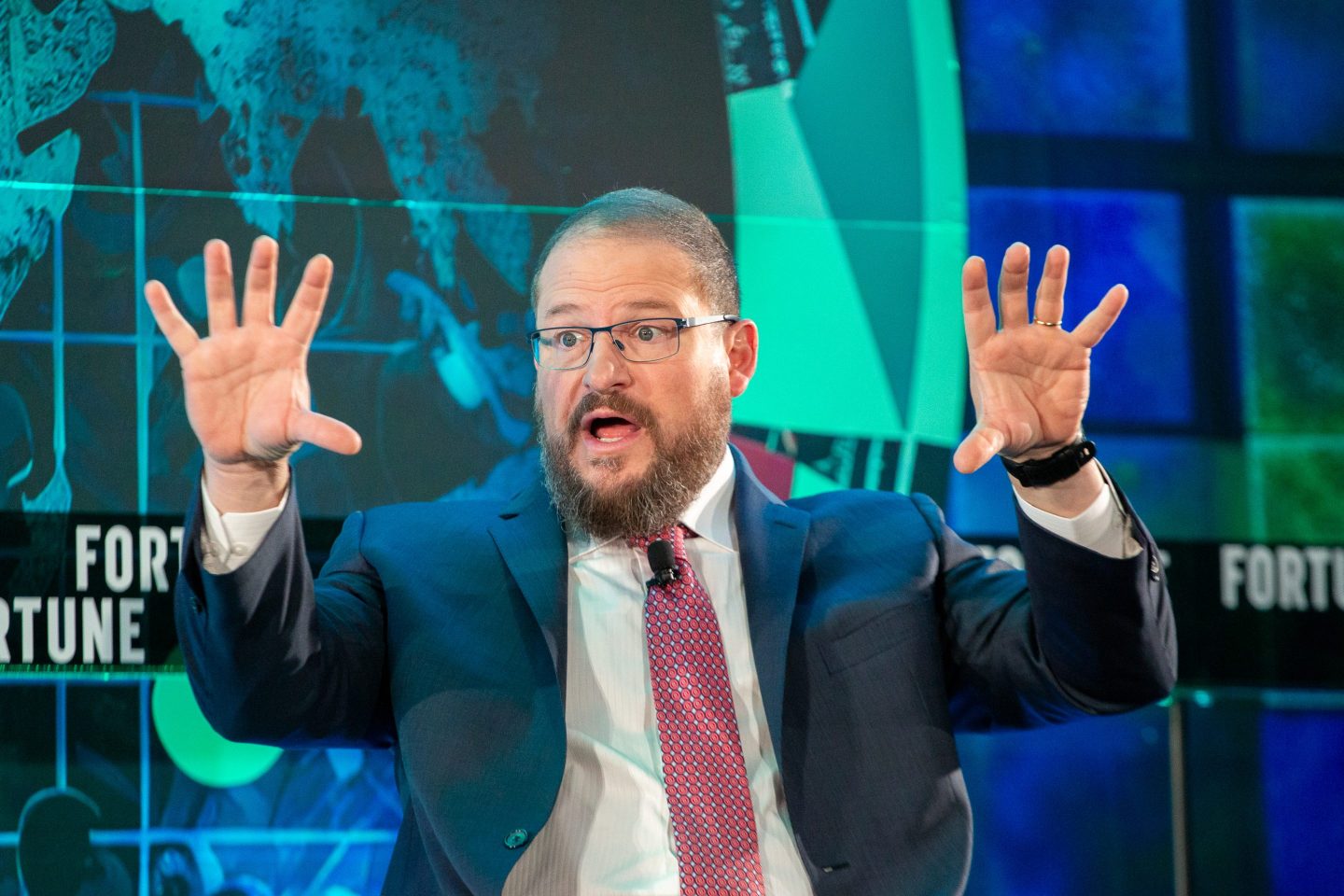Good morning.
Fortune picked an auspicious day to hold its CEO Initiative in Washington. While we were meeting, the Speaker of the House was ousted, the government was thrown into uncertainty, and even the world balance of power suddenly looked different. Sen. Mark Warner (D-Va.) told the group at the beginning of the day that he was confident aid to Ukraine would eventually be approved by Congress. Eurasia Group head Ian Bremmer said at day’s end that the Speaker’s ouster meant the opposite. “This is the worst week Zelensky has had post-invasion…I fear we will look back in a year and say (this) was peak NATO.”
But the topic that most captivated the roughly 100 CEOs who gathered here was not politics or geopolitics. It was generative AI. PagerDuty CEO Jennifer Tejada, who co-chaired the event, correctly captured the mood when she noted that the CEOs seemed caught between FOMO (fear of missing out) and FOGI (fear of getting in.) Some excerpts:
“This could be as powerful as one day you have a feature phone and then you see this new thing called a smartphone, and you say, well this is great. I think it’s probably that order of magnitude change when you think about user experience.”
—Cristiano Amon, CEO, Qualcomm
“I think it’s actually bigger than that. It’s what economists call a general-purpose technology. I put it on the scale of the steam engine or electricity.”
—Erik Brynjolfsson, academic and author, Stanford
“Literally every meeting I go to with a CEO, I ask the question: ‘Who in your organization is responsible for Responsible AI? And can they tell you when you call where AI is being used, what the risks are, and how they’re being monitored?’ And right now it’s about a 90% hit that they don’t have that person.”
—Julie Sweet, CEO, Accenture
“Some of our software developers are 30% more productive (because of generative AI). I don’t intend to get rid of I single one. That makes the task of making things that are using more software more productive and that means you can make more of them. People mistake productivity with job displacement.”
—Arvind Krishna, CEO, IBM
“Throughout my career, I’ve not been a strong believer in industrial policy generally. But I think if you look at the semiconductor industry, and the way in which it’s evolved globally, over decades, what you see are enormous government interventions in virtually every country that plays a significant role…We’re fooling ourselves if we think that abandoning for all practical purposes semiconductor manufacturing is a smart strategy for the United States.”
—Treasury Secretary Janet Yellen
“We have to protect ourselves…You mentioned de-risking versus decoupling (with China). No one is talking about decoupling. To pretend that we could decouple our economies…it’s not a reasonable thing to even say. We’re too intertwined. But we shouldn’t do business in ways that hurt our national security.”
—Commerce Secretary Gina Raimondo
You can read more from the CEO meeting here, here and here. Other news below.

Alan Murray
@alansmurray
alan.murray@fortune.com
TOP NEWS
Horror house
Jason Blum, CEO of Blumhouse Productions, is pioneering a different model of rewarding the creative talent that make his horror flicks: Pay the minimum required by union contracts in exchange for bonuses and profit sharing if a film makes it big in cinemas. That’s helped Blum keep costs down while still offering directors and other talent creative freedom. Blum argues that he builds trust by relying on transparent box office data, unlike streaming companies that keep important metrics secret. Fortune
CEO influence
Former Merck CEO Ken Frazier, long one of the few Black heads of a Fortune 500 company, argues that CEOs have to stand up for important social issues in the face of a growing “anti-woke” movement. “CEOs obviously are among the most influential citizens” who can defend the principles of American democracy, Frazier said at Fortune’s CEO Initiative Conference. In 2017, Frazier quit one of President Donald Trump’s business advisory councils to protest the response to white supremacist demonstrations in Charlottesville, Va. He now runs equal opportunity employment organization OneTen. Fortune
Project Nessie
Amazon created an algorithm dubbed “Project Nessie” to test how high it can increase prices, according to redacted parts of the Federal Trade Commission’s antitrust lawsuit against the e-commerce company. The algorithm would lift prices to see whether competitors would follow suit, and revert if they did not. The FTC and 17 states sued Amazon last week, accusing the company of anticompetitive practices. The Wall Street Journal
AROUND THE WATERCOOLER
Meta’s AI characters played by celebrities like Charli D’Amelio and Tom Brady are dissing the products and brand sponsors they work with in real life by Alexandra Sternlicht
Nearly half of CEOs believe that AI not only could—but should—replace their own jobs by Orianna Rosa Royle
Older millennials are in ‘a constant perpetuating state of playing catch up,’ making them the most financially stressed of any age group by Alicia Adamczyk
One thing is clear about the (remote) workplace of tomorrow, CEOs agree: ‘You don’t need to be in the office to be entirely creative’ by Leo Schwartz
This edition of CEO Daily was curated by Nicholas Gordon.
This is the web version of CEO Daily, a newsletter of must-read insights from Fortune CEO Alan Murray. Sign up to get it delivered free to your inbox.














